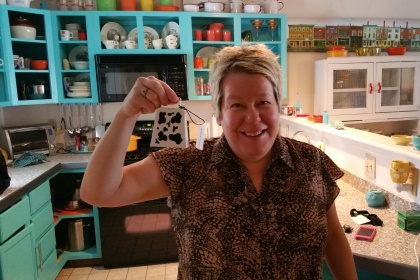
Under Attack, Big Dairy Rings Cowbells for #MilkTruth
February 4, 2015 | Charlotte Warren
Organic Consumers Association
Last week, I attended the International Dairy Foods Association (IDFA) conference in Boca Raton, Fla. I live in Maine so you might assume that I was overjoyed to be in the sunshine state while back-to-back blizzards crippled the frozen northeast.
But truth be told, I love snow. The bigger the storm, the higher the snowbanks, the more I am transported back to the place I grew up—a farm in Pittston, Maine. During the snowstorms of the early 1980s, my brother, sister and I would don our Moon Boots and play “king of the mountain” atop the monstrous snowbanks created when my father plowed our quarter-mile long driveway. The goal of the game was to stay on the top of the snow bank alone, by pushing the others down as they tried to occupy your space.
It’s a game not unlike what the industrial dairy industry is playing right now. But I’ll get to that in a minute.
Growing up on a farm in Maine makes you hardy, I think. We milked the cows before school in the morning and mucked out the stalls in the afternoon. On the weekends I would ride my bike—front basket filled with egg cartons—down our long driveway, along the side of the road, and into my neighbors’ yards selling eggs for a dollar a dozen.
But farms have changed a lot since my childhood. Dairy products currently available in our supermarkets don’t originate from farms like the one I grew up on. Industrial dairies are now supplied by vast farm complexes.
Consumers’ awareness of today’s farming industry has also changed. The shocking exposés of the last decade have educated Americans to the reality of factory farms. Consumers now want to know where their food comes from. We ask more questions about the treatment of the animals, and the use of growth hormones and antibiotics. Our concerns about the dairy industry have altered our buying habits. Almond milk, soy milk and other alternative products are cutting into dairy profits.
Big Dairy isn’t happy about all those questions. They’re feeling under attack. So they’re fighting back. With social media. And cowbells.
“Milk is losing the battle of public opinion now,” said Julia Kadison, CEO of Milk Processor Education Program (MilkPEP). “We’ve kept too quiet. The bear is out of hibernation and growling. We need to place super positive stories—a lot of them. We need to fight the battle in the social media and digital world.”
Because, according to industry leaders, the tarnishing of milk’s reputation has nothing to do with industry and its antibiotics use, its pollution of waterways or its mistreatment of animals.
Nope. Milk is losing in the court of public opinion because consumers just don’t understand how “good” milk is—because the industry just isn’t doing a good job of “telling the milk story.”
If that sounds a lot like Monsanto’s public relations campaign designed to educate (brainwash) consumers, it’s because it is. The entire IDFA conference was devoted to instructing over 1,000 dairy executives from across the country on how to counteract the negative messages aimed at their industry.
Conference sessions entitled, “Partnering across the Dairy Industry to Better Understand Consumers,” “Top Hot Button Issues Keeping Dairy Executives Up at Night,” and “The Food Dialogues: Animal Care and Consumers’ Emerging Expectations” made it clear that the Dairy Industry is ready to fight back.
But the best session of all was “Telling the Milk Story: Safeguarding Consumer Confidence in Milk’s Goodness,” which included the launch by MilkPep of the “Get Real” social media campaign, hashtag: #MilkTruth. The campaign is necessary, we were told, because according to MilkPep’s consumer confidence survey, consumers trust the food industry only slightly more than they trust the banking industry.
Proudly, almost giddily, the MilkPep team rolled out its campaign to the hundreds of us in the audience. The campaign goal, they said, was “to break the internet today” and to fight back against non-experts, like Gwyneth Paltrow, Dr. Oz, and Food Babe.
They explained how they’ve hired seven full-time staffers to set up and manage a digital newsroom, where they will create material, promote it on social media, and engage in conversations to “correct the record” on Big Dairy. They boasted that the oldest person on this new social media staff was 30 years old (as opposed to the average age of industry executives, which I’m guessing to be around 55).
And then, things took a turn for the ridiculous. In front of each of us sat a cowbell—white with black spots to resemble a Holstein cow—with a tag dangling from it that said #MilkTruth. This being the official launch of the campaign, the hundreds of us sitting at our tables were instructed to pick up the cowbells and ring them in unison as a way of saying ENOUGH to the “emotional extremists” giving dairy a bad name.
Picture it. Hundreds of dairy executives in expensive suits feverishly ringing their little cowbells to signal the launch of a campaign to take back the “good name” of their industry.
As I sat there, ringing my cowbell with all the vim and vigor I could muster, it felt like the launch of a “king of the mountain” game straight out of my childhood.
Only this time, it was the Big Dairy executives who were trying to claim their spot on top.
Charlotte Warren is a political and media consultant to the Organic Consumers Association.
